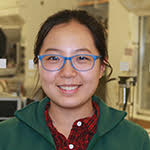Dr. Li joins us this fall as Assistant Professor of Robotics, Sensors, and Manufacturing in Sustainable Agriculture and Environmental Management.
Originally from China, Dr. Li received her bachelor’s at Tsinghua University, then attended Washington University in St. Louis, MO. to pursue her Ph. D. at WashU—Li’s focus was on particulate matter sensors. From there, she went on to pursue her postdoc at Carnegie Mellon University, expanding her research into air quality sensors.
“Air quality influences human health, environment, and climate. Therefore, it is necessary to monitor it regularly,” said Dr Li, but conventional air sensor instruments have not been practical. “The high cost of conventional instruments typically limits the number of monitoring sites, which in turn undermines the accuracy of real-time mapping with insufficient spatial resolution,” said Dr. Li. ”The new trends of air pollution concentration measurement are personalized portable devices and sensor networks.” Because of the lower cost and compact size of these sensors, they could be deployed for large-scale pollution mapping and personal exposure estimation. Dr. Li has developed advanced algorithms to further enhance the accuracy of low-cost air quality sensors for broader applications. She also proposed a new particle sensor design, awarded by NASA, that can roughly distinguish light scattering and light absorbing particles.
With extensive research in air quality sensors, Dr. Li will begin to focus on how these sensors can be applied to agricultural practices, as these sensors have never been deployed for agricultural systems. “Joining the BBE department, I can collaborate with faculty members to use these sensors for real-world problems. Their accuracy, portable size, and low cost make them very suitable for agriculture-related applications. These sensors can provide a new way for us to understand how agricultural activities impact air quality,” said Dr. Li.
When asked what kind of impact Dr. Li hopes to see from the air sensors, she said, “I would like to see my research benefit both fundamental research and people's daily lives. By improving low-cost air quality sensing technology and combining it with the ‘Big Data’ concept, I can extend their application to monitoring agricultural emissions, estimating health-related exposure, and enhancing the accuracy of climate modeling.”
Dr. Li describes her field as “very collaborative and diverse”,noting that a lot of her inspiration came from professors and colleagues. Those positive experiences led her on a path to become an educator. “I am enthusiastic about my research topic and I enjoy working with students. I hope my work can help more and more people realize how important air quality is, and the best way to accomplish this is to become an educator,” said Dr. Li.
Outside of her research, Dr. Li spends time with her husband, their six-month-old baby, and two cats. Her husband is a fellow educator, working as an assistant professor at Missouri University of Science and Technology. “We always encourage and inspire each other,” said Dr. Li. Dr. Li finds the similarity between St. Louis and the Twin Cities to be a big draw, citing Minnesota’s natural resources and diverse communities as two reasons why she will enjoy living here.
